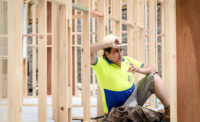Media has focused on Texas Gov. Greg Abbott (R) signing new state legislation that strips its cities and counties of some of their independence, but for workers, more may be at stake.
Effective Sept. 1, the law will bar Dallas—where temperatures were forecast to top 100°F consistently in the last week of June—from enforcing its local mandate that requires employers to provide a 10-minute water break every four hours. After that date in September, employers building there and in Austin, which has a similar rule, can stop the breaks.
The Dallas City Council passed its water break rule in 2015 after the heat stroke death the year before of Roendy Granillo, 25, on a homebuilding project about 50 miles northeast of the city. From what we have heard, the six-year-old Dallas rule has not measurably handicapped employers.
Construction firm managers understandably chafe under regulations that might slow road projects or other outdoor work, even in the state’s summer heat. There is always concern about legal liability and arbitrary enforcement.
But extreme weather, thanks partly to climate change, now affects more areas of the U.S. more frequently. Extended droughts, larger wildfires or inland flooding that had not been a major factor before will dictate new local and regional solutions, including worker safety measures.
Construction in Texas, as well as work in other major state industries such as oil drilling and fracking, expose workers to sweltering summer conditions. The Texas Tribune reports that at least 279 people died of heat-linked causes in the state in 2022. While not all are work-related, the dangers are clear, especially for immigrant labor and for workers who come from other states to fill open jobs, who are less likely to advocate for themselves.
The state in some ways takes its business-friendly mantra too far. Texas legal precedent gives employers more leeway on safety than in many other states. One example is the 2015 Texas Supreme Court holding in Austin v. Kroger Texas, L.P., which involved a worker who slipped and fell while cleaning an oily floor spill. In that case, the court shielded employers from liability if “unreasonably dangerous premises conditions are open or obvious or known to the employee.”
Wrote union attorney Jonathan Karmel of the decision: “In other words, it’s not the fault of the employer who caused or allowed the hazard and exposed the employee to it.”
Invalidating local worker heat safety rules defies common sense, but sense doesn’t always count. For an example, look at the Texas Republican Party 2022 election platform, a curious document.
It has a section calling for construction of a wide range of flood and storm surge protection projects “to avoid further trauma” and loss of life, property and business wealth. But just above that, the party advocates abolishing the U.S. Environmental Protection Agency—as if air pollution measures that EPA enforces had no relation to the atmospheric events that create climate extremes.
A federal heat safety standard in process that is based on common sense and protects workers without overly burdening employers may take another year to finish. But the Texas law now has provided new impetus for that effort to move ahead more quickly.



Post a comment to this article
Report Abusive Comment